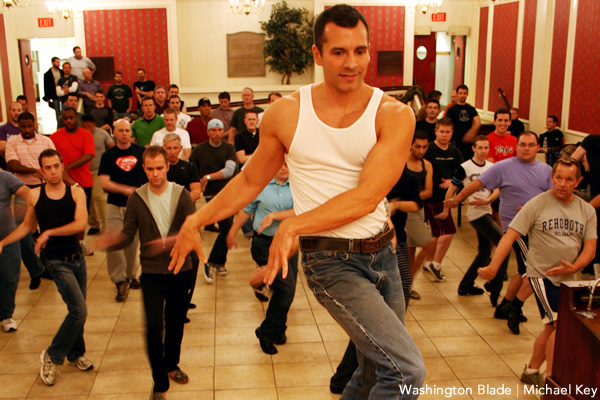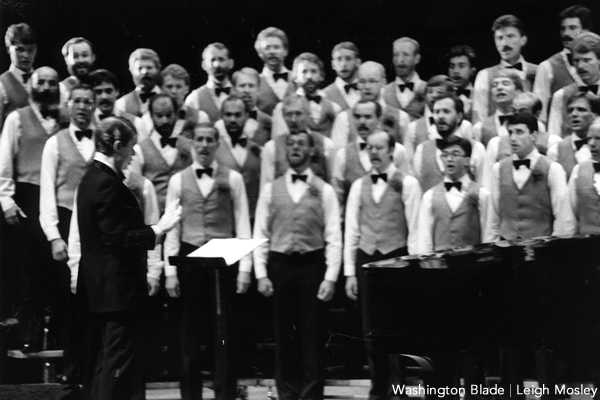GMCW Turns 40
Streaming begins Saturday, June 5 at 7 p.m.
Available through June 20
Tickets: $25
gmcw.org
Discussion of the Gay Men’s Chorus of Washington quickly becomes emotional for its members both veteran and newbie(-ish). They’re the kind of strong feelings that only exist when one has sacrificed and invested in something.
“It’s an experience that touches our soul in a way that not that many LGBTQ+ people get to experience,” says tenor Javon Morris-Byam, a gay 28-year-old music teacher who joined three years ago. “We have music tying us together and in the end, we make a product that we can share with the public and that’s a humbling experience.”
Steve Herman, 79, is a founding member, though he doesn’t sing. One of a group of “non-singing members,” he joined in June 1981 and has helped over the decades painting scenery, designing ads, serving on the board and more. His partner at the time had joined the chorus as a singer.
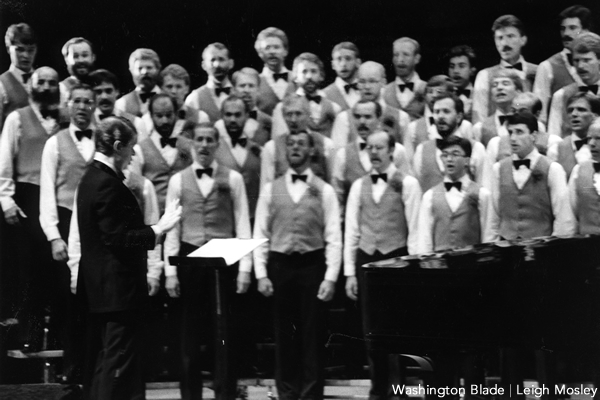
Now retired after 47 years in the federal government, he says the Chorus “has been a major centerpiece of my life.”
“This may sound corny, but I couldn’t imagine my life without the chorus,” Herman says.
The chorus is celebrating its 40th anniversary this weekend with a streaming concert simply dubbed “GMCW turns 40” that can be streamed starting Saturday, June 5 at 7 p.m. and can be viewed until June 20.
Selections will include “From Now On” (from “The Greatest Showman”), “Rise Up,” “Make Them Hear You” (from “Ragtime”), “Truly Brave” and a new song called “Harmony’s Never Too Late!” written for the occasion by Stephen Flaherty and Lynn Ahrens, composers of “Ragtime.” Video clips of past performances will also be included in a montage. Tickets are $25 at gmcw.org.
Thea Kano, the Chorus’s artistic director since 2014 (she was associate director for a decade prior), says “Make Them Hear You” has “kind of become our anthem over the last 10 years,” so contacting its composers for a commission made sense. They premiered it last summer virtually at the Chorus’s Summer Soiree, a COVID-induced postponement of its usual Spring Affair.
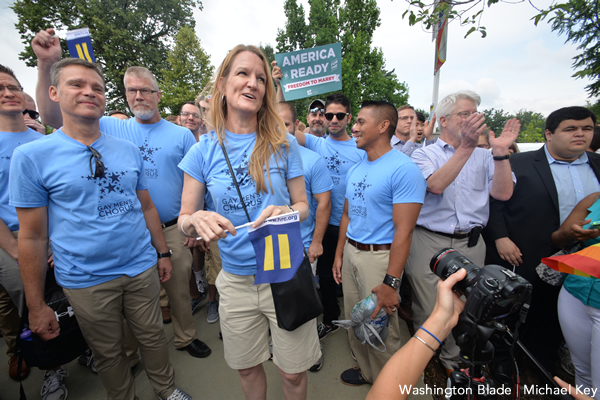
Kano, a straight ally, directs the Chorus with aid from Associate Conductor C. Paul Heins, Assistant Conductor Joshua Sommerville and accompanist Teddy Guerrant. Justin Fyala has been the Chorus’s executive director since 2016. Staff also includes Craig Cipollini (director of marketing), Kirk Sobell (director of patron services) and Alex Tang (accompanist).
Under the main Chorus umbrella are five ensembles: 17th Street Dance, a 14-member performance troupe started in 2016; Rock Creek Singers, a 32-voice chamber ensemble; GenOUT Youth Chorus, a teen choir of about 25; Potomac Fever, a 14-member harmony pop ensemble; and Seasons of Love, a 24-voice gospel choir.
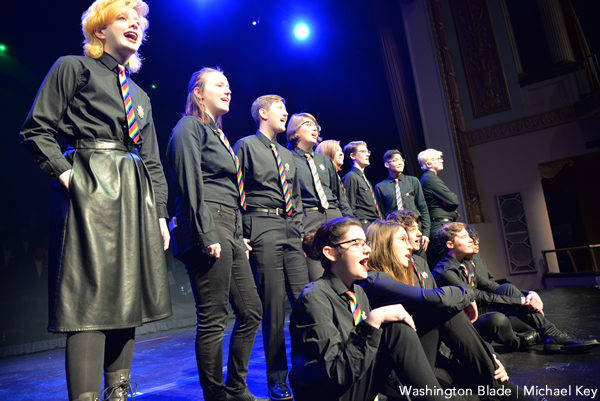
Musically, the Chorus’s repertoire is eclectic.
“(We sing) everything from spiritual to glam rock to punk to traditional classical, and everything in between,” Morris-Byam says. “I love when the chorus is all together and able to produce a big powerful sound.”
Kano says working with Fyala is “a dream” and says under his leadership the Chorus is “in a very healthy financial place, which is wonderful and a very humble thing to be able to say right now particularly given that we’re in a pandemic — that’s not the case with a lot of arts organizations.”
The D.C. Chorus is a quasi-unofficial spin off of its San Francisco counterpart. During an early ’80s national tour, the San Francisco group performed at Washington’s Kennedy Center and had a profound effect on local audiences. Marsha Pearson, a straight woman who lived in Dupont Circle at the time and enjoyed hanging out with gay men, was one such person.
“I couldn’t believe we didn’t have one of these,” she told the Blade 10 years ago for a story on the Chorus’s 30th anniversary. “I thought, ‘We’re the nation’s capital, how come we don’t have this?’”
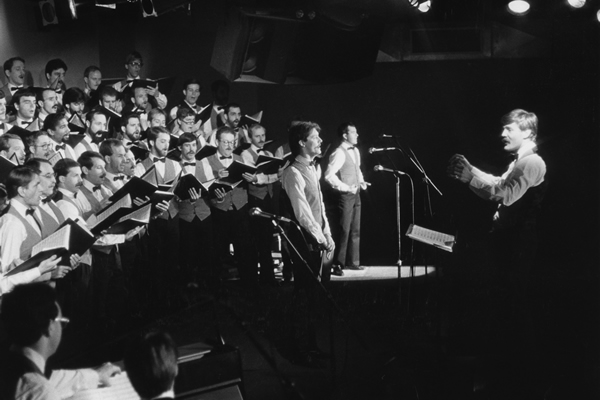
She hand wrote fliers — four to a sheet — had her sister photocopy them at her office, cut them up by hand and passed them out at Capital Pride in 1981. Accounts vary about how many showed up to the first practice at the long-defunct gay community center (no connection to the D.C. Center) on Church Street. Pearson remembers about 30. Others say it was more like 15-ish. It was June 28, 1981 and, by all accounts, an innocuous beginning.
Pearson never sang with the group — it was exclusively a men’s chorus. She asked if anybody had any conducting experience. The late Jim Richardson did and became the first director.
“I still remember the first chord,” Pearson told the Blade in 2011. “It was just a simple thing, you know, like do, mi, so, do, but I just got goosebumps. I was just elated that even one note came out, I was so excited. I got those same goosebumps at the anniversary concert last weekend. I put their CDs on and I get the same thing, especially on certain things they sing. You just can’t believe it sounds so great.”
Click here for more about the history of the group. A bio/history is also available at gmcw.org.
COVID has, of course, wreaked havoc on the operation. Thankfully, Kano says, no members have died from it, though a handful (she says fewer than 10 that she knows of), including Kano, have had it and recovered.
The Chorus continued its Sunday evening rehearsals via Zoom, which, because of the precision required for musical performance, was tougher to take online than, say, a business meeting. It never occurred to the Chorus leadership to take a hiatus.
“I look back now like, ‘Why didn’t we take some time off,’ but I think off the top of my head at the time it was like, “We sing and we’re a social justice organization and community is such a big part of who we are,’” Kano says. “And so for suddenly, with no notice, to have something that we love so much and are so passionate about …. to suddenly just turn the lights off, that wasn’t even an option.”
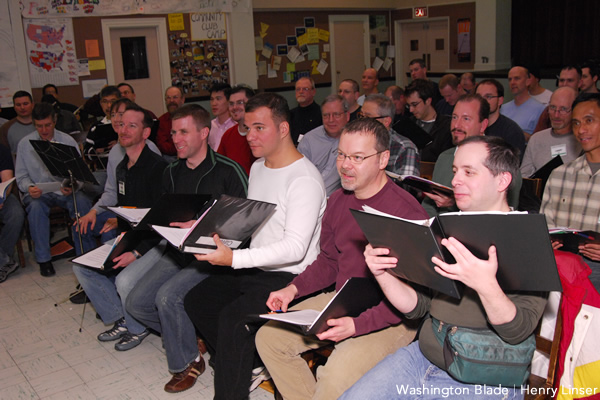
With the Chorus and dancers and GenOUT, there are about 200 current volunteer performers. It’s been slightly higher at times. Some were deterred by the thought of rehearsing via Zoom although some former members no longer in the D.C. area — even a few overseas — rejoined when virtual participation became possible.
The murder of George Floyd and the Black Lives Matter movement last summer and beyond was a galvanizing event. The Chorus responded with its “Let Freedom Sing” concert, which Kano says celebrated the intersection of Black and LGBTQ people.
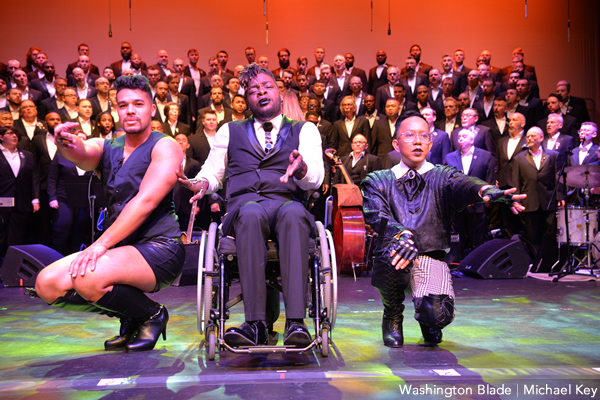
“It was our way of saying we raise our voice in solidarity with those facing injustice,” Kano says.
But does that get messy at times? Surely not everyone in a choir of this size is on the same page politically, even in a progressive city like D.C., right?
As a nonprofit, the Chorus avoids anything ostensibly political. Kano says the issue did arise when they were invited to sing at a Virginia-based gun-reform event last year. They participated, but carefully.
“So anytime you mentioned guns, it becomes political,” Kano says. “It’s not about whether or not we support the Second Amendment. It’s us standing in solidarity with those who have been victims of gun violence.”
Kano says there’s “a very good chance had this been a non-pandemic year,” they would have been invited to sing at the Biden-Harris inauguration, which she says they “absolutely” would have agreed to.
“We did wonder, though, a few years ago what we would have said if 45 were to ask us,” she says. “We didn’t spend a lot of time on it because we knew that wasn’t gonna happen,” she says with a chuckle.
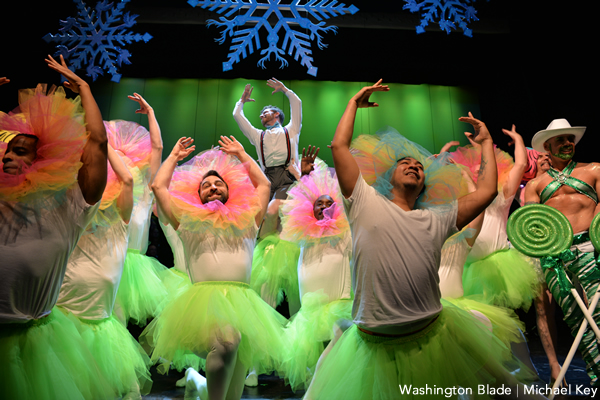
Herman says performing at big, pro-LGBTQ “statement”-type events is woven into the Chorus’s history and is understood.
“Every Christmas Eve, we’d sing for the patients at NIH,” he says. “We still do, only then it was primarily AIDS patients. We sang special concerts when the (AIDS) Quilt was first displayed and when there was a March on Washington. We did a lot of community work and outreach at a time when it was really needed.”
Morris-Byam says even today, with so much progress having been made, the Chorus still is needed. He, by the way, calls Kano “one of the most brilliant musicians I’ve ever met.”
“I believe the Chorus is a strong political statement in itself,” he says. “When we’re making a strong, joyful noise, it’s celebrating everything we are, what we can be, and everyone who has gotten us where we are.
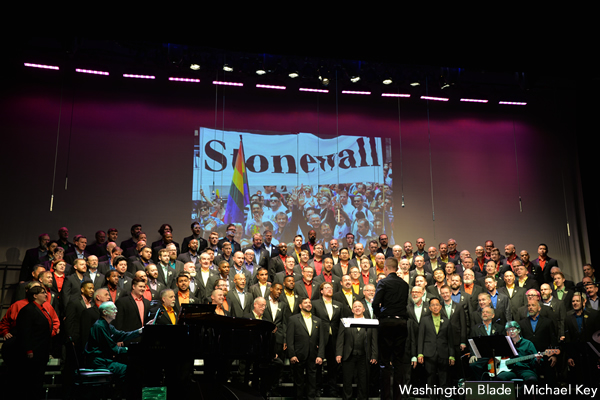
There have been challenges over the years — finding new office space, patching together individual vocal parts for virtual performances — but no warring factions. Kano is, by most accounts, extremely well liked.
The future, Kano says, is bright. She hopes to resume in-person rehearsals in the fall. She spent a big chunk of early lockdown transcribing a Puccini “Gloria Mass” for tenor/bass chorus. She plans to program it with works by Cole Porter eventually.
Ultimately, Kano says, her goals for the Chorus are about making great art.
“Art comes first,” she says. “Because that’s how we deliver our mission. And if we put great art first, it’s going to attract great people. It’s going to both as members and as audience members and patrons, and therefore it’s going to attract great funding, and then all that goes right back into the arts we can further our expansion and our ability to get the mission out.”
